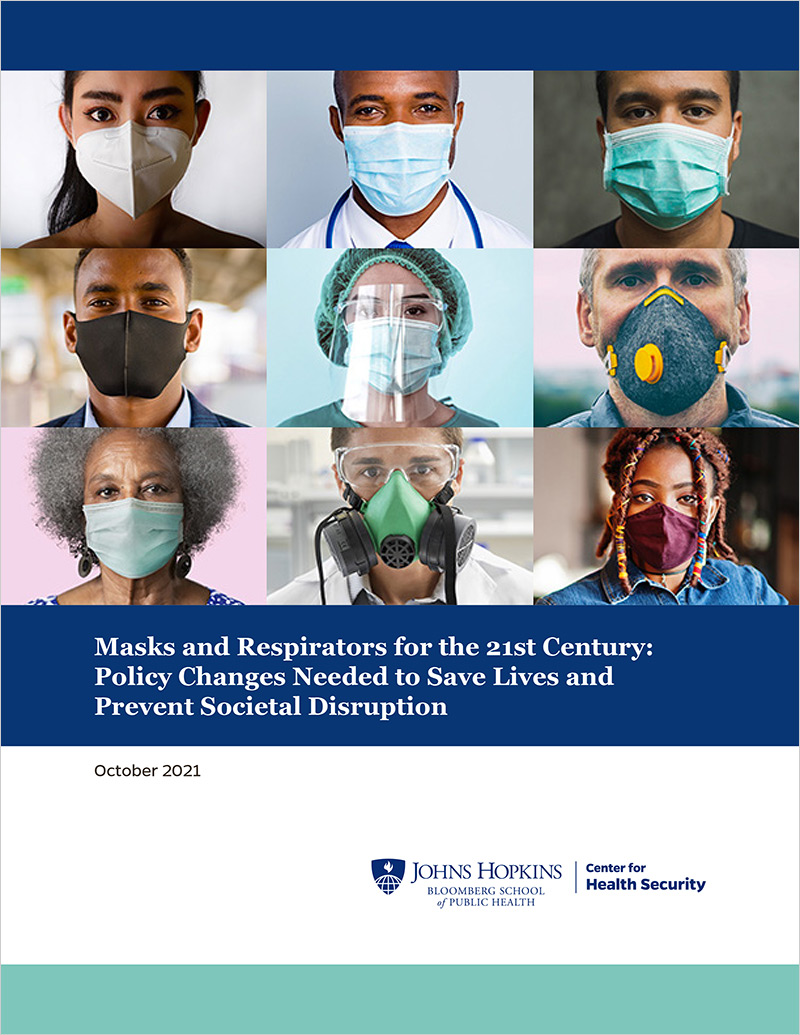New Report: Masks and Respirators for the 21st Century: Policy Changes Needed to Save Lives and Prevent Societal Disruption
Center News

October 5, 2021 – The Johns Hopkins Center for Health Security at the Bloomberg School of Public Health released a new report outlining how the federal government can introduce policies that promote a sustainable mask market aimed at improving mask quality and supply and to save lives. The approach outlined in the report touches the development, manufacturing, and stockpiling of masks and respirators for healthcare workers, the nonhealthcare workforce, and the public in the U.S.
The new report, Masks and Respirators for the 21st Century: Policy Changes Needed to Save Lives and Prevent Societal Disruption, points out that the ubiquitous disposable masks and disposable N95 respirators used by healthcare workers have not appreciably improved since the mid-1990s. A confluence of factors currently stymie the mask market, including industrial inertia, lack of competition, complacent consumers, regulatory barriers, an uncertain market, and lack of U.S. government policy.
“Widespread public use of effective, commercially available masks and respirators could help save many thousands of lives during the next severe pandemic of a respiratory pathogen and reduce the resulting economic damage,” the authors wrote. “The design and manufacture of more efficient, well-fitting, and comfortable masks are possible through support from federal action.”
The report lists seven general principles for bettering such devices, including:
- Use of masks and respirators that block both outgoing and incoming respiratory droplets and aerosols consistent with or better than current relevant standards; are cost-effective; and offer a significant advance in fit, wearability, communication, reusability, shelf life, and/or supply-chain reliability.
- A shift to greater use of improved reusable devices, such as elastomeric respirators, in healthcare facilities.
- Increased use of masks by the public to prevent routine illness such as influenza, as well as offer protection for seasonal allergies, dust, and smoke. This would help maintain an active market needed to sustain manufacturing capacity.
Based on the principles, the report recommends federal action:
- Strategic National Stockpile should supplement its supply of N95 filtering facepiece respirators with the purchase of reusable elastomeric half-mask respirators to be available now to healthcare workers in an unanticipated emergency.
- The Biomedical Advanced Research and Development Authority should foster the development of improved medical masks, respirators, and public use masks by continuing to issue challenges and establishing .
- The Biomedical Advanced Research and Development Authority should explore providing financial incentives or support to U.S. companies to scale up and maintain production once devices meeting target product profiles are developed.
- The Centers for Disease Control and Prevention and the Assistant Secretary for Preparedness and Response should work with professional organizations, accrediting bodies, and the Centers for Medicare and Medicaid Services to find ways to encourage hospital respiratory protection programs to move toward greater use of reusable respirators as part of a multipronged approach to routine respiratory protection.
- The Centers for Disease Control and Prevention should have a sustained national communications campaign to prevent illness by encouraging mask use by the public during influenza season, when experiencing a cold, during allergy season, or when there are high levels of smoke or dust.
You can access the new report here.
